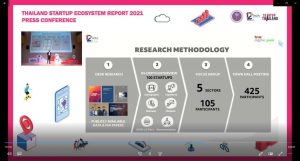สำนักงานนวัตกรรมแห่งชาติ (องค์การมหาชน) หรือ NIA ทำงานร่วมกับภาคีเครือข่ายทั้งภาครัฐและเอกชน เพื่อส่งเสริมแหล่งความรู้ ตลอดจนการพัฒนาฐานข้อมูลให้แก่กลุ่มวิสาหกิจเริ่มต้นหรือสตาร์ทอัพ สำหรับใช้เป็นกลไกหนึ่งที่จะช่วยขับเคลื่อนเศรษฐกิจและสังคมไทยให้ก้าวหน้า ซึ่งล่าสุด NIA ได้ริเริ่มและจัดทำ ‘รายงานการพัฒนาระบบนิเวศวิสาหกิจเริ่มต้นประเทศไทย ประจำปี 2564’ ซึ่งจะนำเสนอข้อมูลภาพรวมภูมิทัศน์ของระบบนิเวศสตาร์ทอัพในปีที่ผ่านมา เพื่อเป็นแนวทางในการส่งเสริมสตาร์ทอัพรุ่นใหม่ ให้มีความสามารถในการประกอบธุรกิจรวมถึงแข่งขันกับคู่แข่งได้อย่างมีประสิทธิภาพ และมีระบบนิเวศสตาร์ทอัพ (Startup Ecosystem) ที่เอื้อต่อการประกอบธุรกิจมากขึ้น เพื่อเร่งสร้างผู้ประกอบการรายใหม่ที่ใช้องค์ความรู้ด้านวิทยาศาสตร์ เทคโนโลยีและนวัตกรรมอย่างเป็นระบบ


ดร.พันธุ์อาจ ชัยรัตน์ ผู้อำนวยการ NIA กล่าวว่า “รายงานการพัฒนาระบบนิเวศวิสาหกิจเริ่มต้นประเทศไทย ประจำปี 2564 เป็นรายงานฉบับที่ 4 ที่ได้จัดทำต่อเนื่องมาตลอดตั้งแต่ปี 2557 โดยได้รับความร่วมมือจากประชาคมกว่า 300 ราย ทั้งกลุ่มสตาร์ทอัพไทยและต่างชาติ นักลงทุน ภาคการศึกษา ภาครัฐ และหน่วยงานที่เกี่ยวข้อง มาร่วมกันแสดงความคิดเห็น โดยมีเป้าหมายร่วมกันคือ การเพิ่มขีดความสามารถในการแข่งขันสู่การสร้างนักรบใหม่ทางเศรษฐกิจ พร้อมผลักดันประเทศไทยสู่เศรษฐกิจฐานนวัตกรรม และพลิกฟื้นเศรษฐกิจและสังคมของประเทศในเร็ววัน นอกจากนี้ NIA ยังเปิดโอกาสในการเข้าถึงและใช้ประโยชน์โครงสร้างพื้นฐานทางนวัตกรรม การสนับสนุนงานวิจัย การอบรมพัฒนาด้านทักษะหลากหลายด้าน รวมถึงการใช้องค์ความรู้ด้านวิทยาศาสตร์ เทคโนโลยี และนวัตกรรมอย่างเป็นระบบ เพื่อเพิ่มคุณค่าให้สตาร์ทอัพไทยอย่างยั่งยืน”


สำหรับรายงานฉบับนี้ ได้สรุปข้อมูลที่เป็นอุปสรรคสำคัญของการดำเนินธุรกิจในช่วงวิกฤตเศรษฐกิจ พร้อมข้อแนะแนะ 4 ด้าน ประกอบด้วย 1) ความพร้อมของกำลังคน (Manpower Readiness) โดยผู้ก่อตั้งสตาร์ทอัพส่วนใหญ่มักให้ความสำคัญกับการพัฒนาเทคโนโลยี แต่ขาดทักษะในการบริหารจัดการองค์กร รวมถึงแรงงานที่มีทักษะด้านเทคโนโลยียังมีจำนวนไม่เพียพอ อีกทั้งสตาร์ทอัพเองไม่สามารถจ้างแรงงานที่มีฝีมือด้านเทคโนโลยีที่มีฐานเงินเดือนสูงได้ จึงเสนอแนะให้จัดตั้งศูนย์ฝึกอบรม พร้อมสร้างแพลตฟอร์มชุมชนออนไลน์เพื่อเข้าถึงแรงงานรุ่นใหม่ที่มีทักษะฝีมือด้านเทคโนโลยี พัฒนาทักษะความเป็นผู้ประกอบการ รวมถึงการได้รับเงินสนับสนุนค่าจ้างพนักงานบางส่วนจากรัฐบาลเพื่อช่วยแบ่งเบาต้นทุนของสตาร์ทอัพ
2) แหล่งเงินทุน (Source of Funding) สตาร์ทอัพยังไม่มีแผนการเงินและแผนการดำเนินธุรกิจที่ชัดเจน โดยเฉพาะการประเมินมูลค่าบริษัทในระยะยาว อีกทั้งนักลงทุนส่วนใหญ่สนใจลงทุนเฉพาะบางธุรกิจเท่านั้น ทำให้บางธุรกิจที่ไม่ได้รับความนิยม หาแหล่งเงินทุนได้ยาก สตาร์ทอัพในระยะเริ่มต้นไม่ได้รับการส่งเสริมที่มากพอ จึงทำให้ไม่สามารถเข้าถึงวงเงินกู้ของธนาคารพาณิชย์เพื่อนำมาต่อยอดการทำธุรกิจได้ จึงมีข้อเสนอให้สนับสนุนสตาร์ทอัพให้เข้าถึงสินเชื่อดอกเบี้ยต่ำเพื่อนำไปพัฒนาสินค้าและบริการ พร้อมทั้งสร้างมาตรฐานคู่มือการระดมทุนเพื่อกำหนดทิศทางทั้งระบบนิเวศ สร้างแพลตฟอร์มรวบรวมและประชาสัมพันธ์ข่าวสารการระดมทุนจากในประเทศและต่างประเทศ
3) การหากลุ่มลูกค้าและการขยายธุรกิจ (Growth & Scalability) สตาร์ทอัพยังขาดประสบการณ์ในการติดต่อกับกลุ่มลูกค้าระดับองค์กรขนาดกลางและขนาดใหญ่ ขาดองค์ความรู้เกี่ยวกับการตลาดและการทำธุรกิจในต่างประเทศ ขาดการวางแผนการเงิน เพื่อหมุนเวียนหรือขยายธุรกิจให้เติบโตขึ้นอย่างมีประสิทธิภาพ จึงมีข้อเสนอแนะให้จัดกิจกรรมสร้างเครือข่ายทางธุรกิจทั้งในกรุงเทพและภูมิภาค สนับสนุนการเชื่อมต่อระหว่างธุรกิจสตาร์ทอัพที่มีนวัตกรรมกับองค์กรขนาดใหญ่ที่ต้องการนวัตกรรมเข้ามาสนับสนุนธุรกิจ พร้อมทั้งผลักดันสตาร์ทอัพไทยเข้าสู่ระบบการค้นหาในตลาดโลกเพื่อให้เป็นที่รู้จักในกลุ่มนักลงทุนและกลุ่มลูกค้าจากทั่วโลก
4) การสนับสนุนจากภาครัฐและหน่วยงานที่เกี่ยวข้องในระบบนิเวศ (Support from Government & Partners) พบว่าภาครัฐควรมีนโยบายเพื่อผลักดันให้สตาร์ทอัพไทยสามารถเป็นผู้ประกอบการในระดับภูมิภาคอย่างจริงจัง อีกทั้งควรสนับสนุนด้านเงินทุน รวมถึงการสร้างเกณฑ์คุณสมบัติในการรับทุนที่เอื้อต่อทุกธุรกิจของวิสาหกิจเริ่มต้น จึงมีข้อเสนอแนะให้เกิดการเชื่อมโยงโครงการของภาครัฐเพื่อสนับสนุนและผลักดันสตาร์ทอัพสู่การเป็นยูนิคอร์นในประเทศไทย สร้างฐานความรู้งานวิจัย ส่งเสริมการพัฒนาเขตพื้นที่นำร่องย่านนวัตกรรม พร้อมผลักดันให้ประเทศไทยก้าวเข้าสู่รัฐดิจิทัล (Digital Government) และพัฒนาหลักเกณฑ์หรือระเบียบทางราชการให้มีความคล่องตัว โดยอาศัยการเข้าถึงบริการจากภาครัฐด้วยเทคโนโลยี (Gov Tech) เป็นตัวเชื่อมโยงและอำนวยความสะดวกในการทำงานแทนที่การติดต่อและเข้าถึงภาครัฐแบบเดิม ควบคู่ไปพร้อมๆ กับเทคโนโลยีพลเมือง (Civic Tech) นำเทคโนโลยีมาเชื่อมความสัมพันธ์กับภาครัฐ ให้พลเมืองมีส่วนร่วมในการตัดสินใจนโยบายของรัฐบาลหรือปรับปรุงกระบวนการต่างๆ ให้เข้าถึงผลประโยชน์ของประชาชนได้


นอกจากนั้นจากรายงานฉบับนี้ยังได้วางแนวทางให้สตาร์ทอัพในด้านการใช้ความสามารถในการประกอบธุรกิจและแข่งขันได้อย่างมีประสิทธิภาพในทุกด้าน เพราะธุรกิจสตาร์ทอัพจะถูกนำไปใช้ประกอบการการวางแผนส่งเสริมระบบนิเวศสตาร์ทอัพของประเทศไทย โดยคณะกรรมการวิสาหกิจเริ่มต้นแห่งชาติในอนาคตภายใต้ 4 แนวทาง คือ
Build up awareness – การสร้างความตระหนักรู้ และการรับรู้เพื่อส่งเสริมสตาร์ทอัพให้เติบโตขึ้น ทั้งการสร้างศูนย์กลางแห่งการประชาสัมพันธ์ และการสนับสนุนสื่อสาธารณะให้รับรู้และเข้าใจธุรกิจสตาร์ทอัพ
Ease of Doing Business – การพัฒนาโครงสร้างพื้นฐานสำหรับสตาร์ทอัพ ทั้งเรื่องการปรับปรุงแก้ไขกฎหมายที่เกี่ยวข้องในการทำธุรกิจสตาร์ทอัพทั้งระยะเร่งด่วน และระยะยาว การรวบรวมข้อมูลเชิงสถิติสำหรับสตาร์ทอัพเพื่อนำมาวิเคราะห์จัดทำมาตรการสนับสนุนที่เหมาะสม รวมถึงการพัฒนาย่านนวัตกรรมเพื่อรองรับการทำธุรกิจสตาร์ทอัพ
Strengthen Ecosystem – การส่งเสริมการบ่มเพาะธุรกิจสตาร์ทอัพ โดยเริ่มตั้งแต่การปฎิรูประบบการศึกษาเพื่อสนับสนุนการสร้างธุรกิจสตาร์ทอัพในเด็กรุ่นใหม่ การวางแนวทางเพื่อส่งเสริมการพัฒนางานวิจัยเทคโนโลยีสำหรับอนาคต ไปจนถึงการสร้างสถาบันสนับสนุนผู้ประกอบการ
Incentives & Supports – การออกมาตรการสนับสนุนโดยภาครัฐทั้งด้านการเงิน/การคลังแก่สตาร์ทอัพ การวางแนวทางผ่อนปรนสำหรับนักลงทุนต่างชาติที่ลงทุนในประเทศไทย การปรับปรุงกฎเกณฑ์ที่เกี่ยวข้องกับตลาดทุนให้เหมาะสมกับการพัฒนาและการเติบโตของสตาร์ทอัพ และการวางแนวทางสนับสนุนการจัดเรตติ้งเทคโนโลยี และการค้ำประกันสินเชื่อเทคโนโลยี
ตั้งแต่ปี 2563 จนถึงปัจจุบัน “ระบบนิเวศสตาร์ทอัพของประเทศไทย” ก้าวสู่ปีแห่งความท้าทายจากสถานการณ์การระบาดของ COVID-19 ที่ส่งผลกระทบให้ทุกส่วนต้องปรับตัวเพื่อความอยู่รอด แต่ก็เป็นโอกาสให้สตาร์ทอัพได้ปรับบริการและเพิ่มธุรกิจใหม่ที่เป็นดิจิทัลอย่างเต็มรูปแบบ ไม่ว่าจะเป็น E-Commerce และ Online Service อย่าง Food Delivery ที่เติบโตขึ้นอย่างมาก รวมถึง Online Education Platform และ Digital Content ที่ได้รับความนิยมจากผู้ใช้งานเพิ่มมากขึ้น ทั้งนี้ จากข้อมูลของ TECHSAUCE STARTUP DIRECTORY ชี้ให้เห็นว่าตัวเลขการระดมทุนในปี 2563 มีมูลค่ากว่า 369 ล้านดอลล่าสหรัฐ จากการลงทุน 36 ครั้ง นับว่าเป็นปีที่การระดมทุนมีมูลค่าสูงสุดในประวัติศาสตร์ระบบนิเวศสตาร์ทอัพไทย



สำหรับในปี 2564 นี้ มูลค่าการลงทุนมีแนวโน้มที่จะขยับตัวสูงขึ้น จากข้อมูลการลงทุนถึงเดือนสิงหาคมที่ผ่านมามีมูลค่ากว่า 289 ล้านดอลล่าสหรัฐ จากการลงทุน 37 ครั้ง โดยการระดมทุนใน Series D+ ของ Flash Express ยังคงมีมูลค่าสูงสุดเป็นอันดับ 1 ที่ 150 ล้านดอลล่าสหรัฐ ตามมาด้วย Zipmax ที่ได้ระดมทุนใน Series A ที่ 55.98 ล้านดอลล่าสหรัฐ และอันดับที่ 3 คือการระดมทุนของ Sunday Insurance ใน Series ที่ 45 ล้านดอลล่าสหรัฐ ซึ่งเชื่อว่าน่าจะมีการลงทุนเพิ่มขึ้นอีกในระบบนิเวศสตาร์ทอัพต่อเนื่องไปจนถึงสิ้นปีนี้ สะท้อนให้เห็นถึงศักยภาพของสตาร์ทอัพไทยที่ยังสามารถก้าวไปสู่ระดับ Regional Player ได้อย่างแน่นอน
สำหรับผู้ที่สนใจสามารถดาวน์โหลดข้อมูลเพิ่มเติมเกี่ยวกับรายงานการพัฒนาระบบนิเวศวิสาหกิจเริ่มต้นประเทศไทย ประจำปี 2564 ได้ที่เว็ปไซต์ www.startupthailand.org
NIA present Thailand Startup Ecosystem Report 2021
Ready to push Thailand towards ‘Country of startups’
The National Innovation Agency (NIA) has joined forces in both public and private sectors to promote a knowledge sharing culture as well as develop databases for start-up enterprises or startups to use as a mechanism to help drive the Thai economy and society forward. Recently, NIA has initiated the ‘Thailand Startup Ecosystem Report 2021’, which presents an overview of the startup ecosystem landscape in the past year, as a guideline to promote and inspire new startups to have the ability to flourish and grow to conduct business and compete with competitors effectively. Also, increases more conductive to doing business in the Startup Ecosystem to accelerate the creation of new entrepreneurs using scientific knowledge, systematic technology and innovation.
Dr. Pun-Arj Chairatana, Executive Director of National Innovation Agency (NIA), says “Thailand Startup Ecosystem Report 2021 is the 4th report that has been continuously prepared since 2014 together with cooperation of more than 300 communities including both Thai and foreign startups, investors, education sector, government sector, and related agencies to come up with thoughts and ideas. The community shares the same vision and goals to promote startups in which to increase competitiveness to create new economic warriors in the right course, and ready to push Thailand towards an innovation-based economy and are expected to revitalize the economy and society shortly. NIA also provides opportunities to access and leverage innovative infrastructure such as research support training to develop various skills including the systematic use of knowledge in science, technology, and innovation to add value to Thai startups in a sustainable way.”
According to the report of the summary information on the major obstacles in doing business in an economic crisis, there are 4 areas of recommendations, including 1) Manpower Readiness: Most startup founders focus on technology development but lack business management skills, not to mention the insufficient technology-skilled labor force. Moreover, many startups struggle to match tech talent’s high base salary, therefore, it was suggested to establish a training center and create an online community platform to reach a new generation of tech-savvy workers to develop entrepreneurial skills. Including receiving partial wage subsidies from the government to help alleviate the expenses of startups companies.
2) Source of Funding: Startups do not have a clear financial plan and business plan, especially the long-term valuation of the company. Moreover, most investors are interested in investing only in certain businesses causing some businesses that are not well-known difficult to find funding. Also, early start-ups did not get enough promotion, as a result, unable to access the credit limit of commercial banks for further business operations. Therefore, it is suggested to support startups to access low-interest loans for product and service development. As well as create a standard for fundraising handbooks to determine the direction of the entire ecosystem and build a platform to collect and publicize fundraising news from domestic and international.
3) Growth & Scalability: Majority of startups still lack experience in dealing with medium and large enterprise customers. They still lack knowledge on marketing and expanding business overseas as well as being inexperienced on financial planning to manage cash flow or grow business efficiently. The suggestion has been made to create an initiative to build a business network nationwide and across the globe. This is to encourage the connection between the startups that have great innovation with the large size enterprises who are in need of innovation to fuel the business. Thai startups should be supported and driven to the global stage where they can make their presence among investors and customers from all
around the world.
4) Support from Government & Partners in the ecosystem: Government should have a policy to drive Thai startups to a global scale with the support of financial funding as well as passing rules and regulations that are beneficial to startups growth. There should be a government support initiative that helps fuel the growth of Thai startups to become a “unicorn stage”. The knowledge resources should be built to strengthen the fundamentals along with the area development to encourage and pilot new innovation all towards driving the country to a digital age (Digital Government). Legal processes or regulations should be improved for better flexibility to allow startups to access support from the government through technology (Gov Tech). This technology should be the main access point to facilitate the connection between startups and the government for better communication instead of the old and complicated traditional way along with the Civic tech that allows people to be involved in the government decisions process in passing policy and any improvement to bring more benefits to the citizens.
Not only that, the report also lays out a developmental plan for startups to grow and compete in the market efficiently in all aspects since startups will play a vital role in the growth of the business ecosystem. The board of national startups has laid out 4 key aspects of the plan which includes
1. Build up awareness – Building awareness for growth which involves creating a centralized public relations and enhancing public awareness and understanding for startups business.
2. Ease of Doing Business – Building fundamentals structure for startups both in terms of improving rules and regulations for startups in the short – long term and collecting statistics of startups to analyze and make appropriate supporting measures as well as developing areas to pave ways for new innovation from startups.
3. Strengthen Ecosystem – Nurturing startups starting with the education reforms to encourage the birth of new startups from the new generations followed by the enhancement of research and development for new technologies along with the creation of new institutions to support the entrepreneurs.
4. Incentives & Supports – New measures from the government to fund the startups and more relaxed regulations to encourage overseas investors to invest inside Thailand. The improvement of regulations in the equity market to facilitate the development and growth of the startups alongside with the initiation of technology rating and collateral of technology credit.
Since 2020 till present, the Thai startup ecosystem has faced the greatest challenge from the Covid-19 outbreaks that affects all parties to adapt and survive. However, it also presents the opportunity for startups to adjust their services and expand their business to become fully digitized for instance E-commerce and Online Service such as Food Delivery which has overseen a tremendous amount of growth. Online Education Platform and Digital Content have also seen a huge rise in users growth as well.
Although, in the past, startups have to face an economic crisis or an epidemic, Thai startups have risen to the unicorn level with $100 million in funding. Reflecting the potential of Thai startups in this ecosystem to have the opportunity to advance to the Regional Player level.
For more information, download the Thailand Startup Ecosystem Report 2021 at the website www.startupthailand.org































































